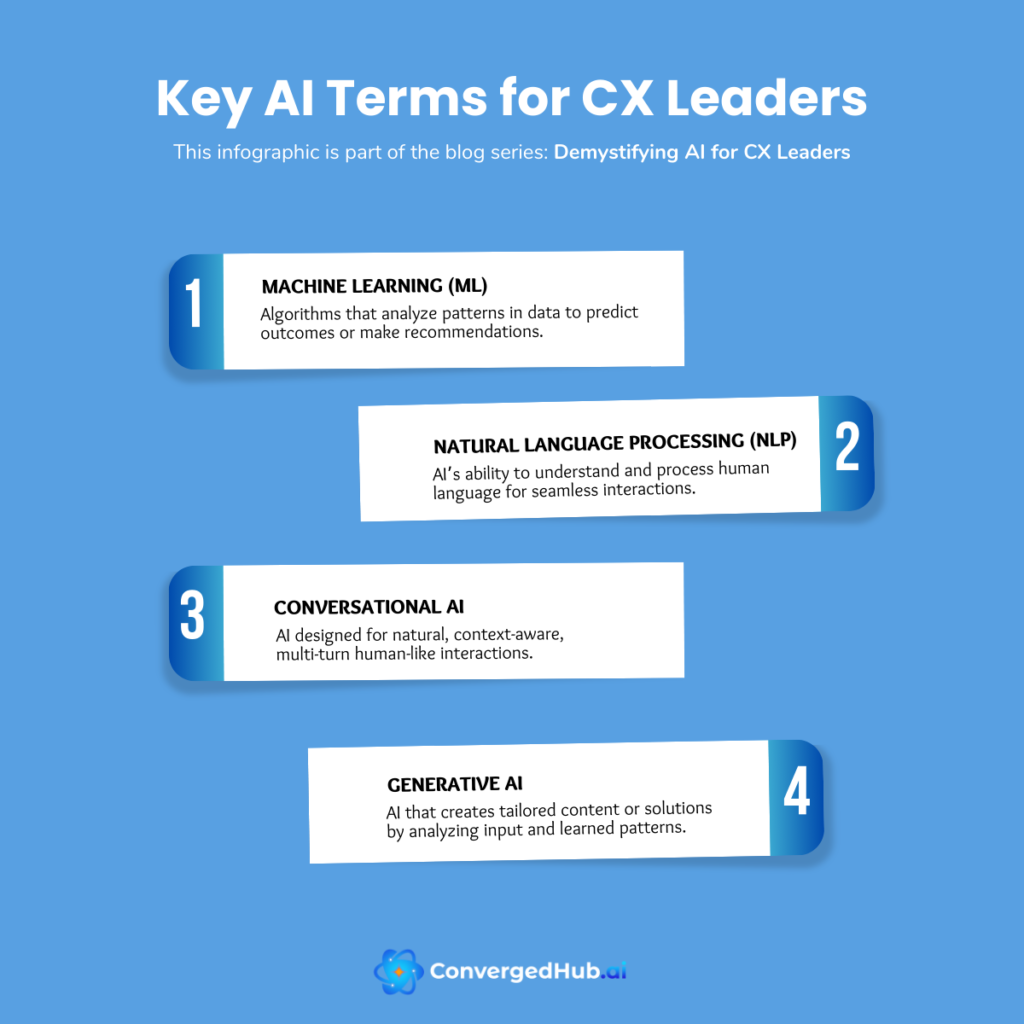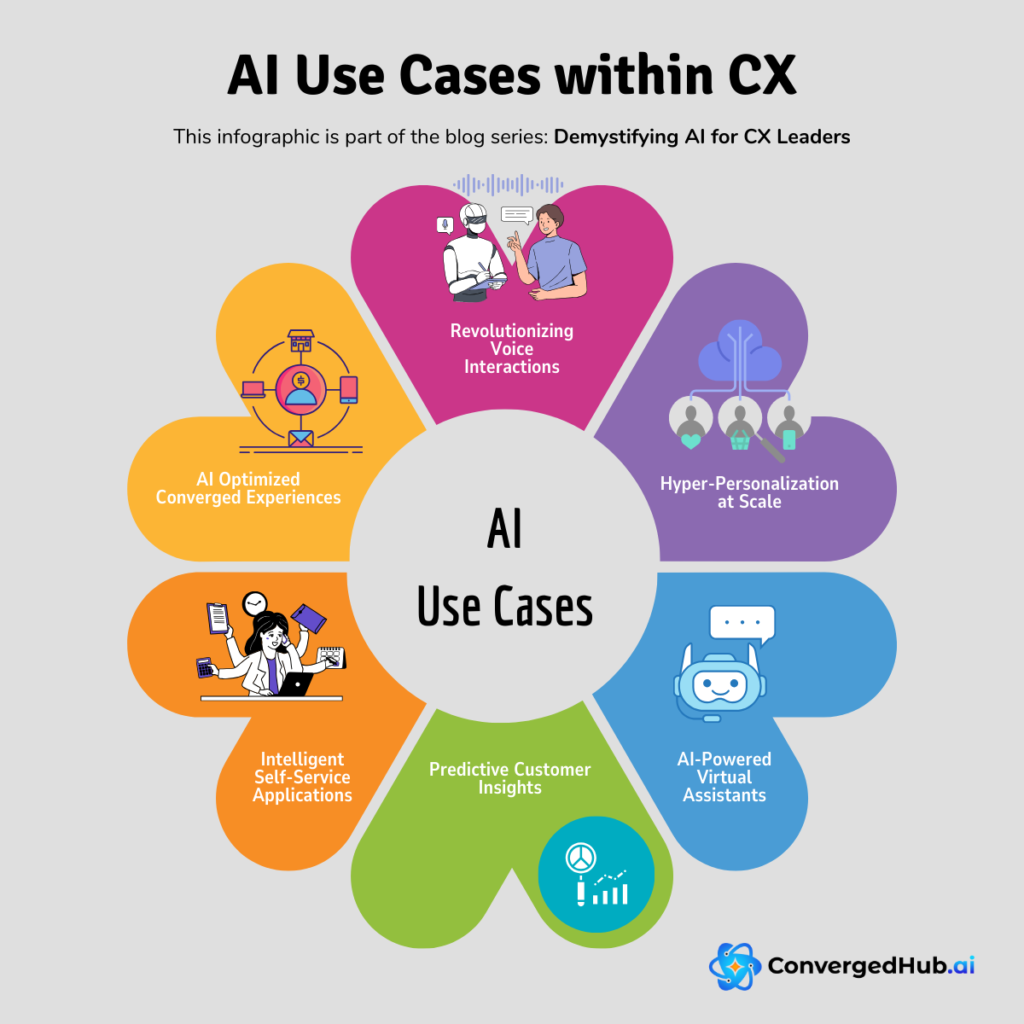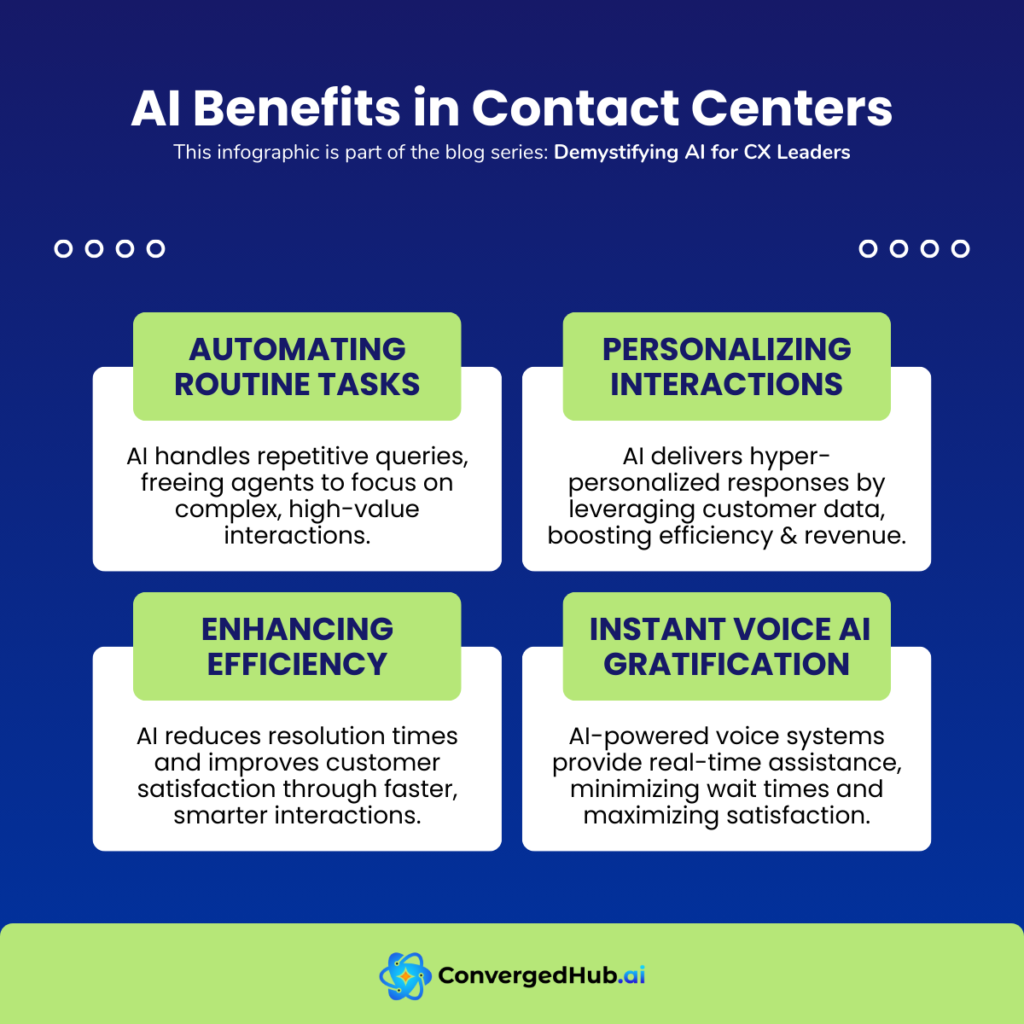'Demystify' Blog Series
Demystifying AI for CX Leaders
Table of Contents
BOOK A DEMO
ConvergedHub.AI empowers CX Leaders to build innovative AI-led Customer Experiences.
Talk to us today to learn more.
AI’s Impact on Modern Contact Centers
TL;DR (Too Long; Didn’t Read)
AI is reshaping contact centers, enabling automation, hyper-personalization, and real-time decision-making to meet evolving customer expectations for seamless, fast, and tailored interactions.
Key Technologies
- Machine Learning (ML): Predicts behaviors, detects churn, and personalizes recommendations.
- NLP & Conversational AI: Drives human-like, context-aware chat and voice interactions.
- Generative AI: Crafts tailored responses, simplifies complex information, and enhances automation.
AI Use Cases
- Voice AI: Handles accents, languages, and nuanced queries for faster resolutions.
- Hyper-Personalization: Adapts offers and messages in real-time.
- Predictive Insights: Anticipates needs and prevents churn.
- Sentiment Analysis: Enhances engagement through real-time emotion detection.
- Fraud Detection: Identifies risks instantly, ensuring security.
Real-World Impact
- Decathlon’s AI chatbot managed a 4.5x inquiry surge, freeing agents for complex tasks.
- Allianz’s AI-enabled claims process boosted satisfaction to 90%.
- Amazon’s AI-driven dynamic pricing increased revenue by 25%.
Benefits for CX Leaders
AI streamlines operations, personalizes interactions, and ensures faster resolutions, delivering exceptional customer experiences at scale. Leaders must embrace AI now to stay ahead in the customer experience landscape.
What Is AI?
Artificial Intelligence (AI) refers to machines that simulate human intelligence to perform tasks like problem-solving, decision-making, and natural language understanding. In the context of contact centers, AI is the driving force behind automation, enhanced customer interactions, and operational efficiency.
Customer expectations are evolving rapidly. In today’s digital-first world, they demand instant resolutions, personalized interactions, and seamless experiences across channels. For contact centers, this transformation brings immense challenges but also unprecedented opportunities—thanks to artificial intelligence (AI).
AI has become a game-changer in modern contact centers, empowering businesses to automate routine tasks, personalize customer interactions, and enable smarter, faster decision-making. For CX leaders, embracing AI isn’t just an option—it’s a necessity to stay competitive.
Key AI Terms for CX Leaders

1. Machine Learning (ML)
ML are algorithms that analyze patterns in customer (or any other) data to make predictions or recommendations. For example, ML can predict customer sentiment, detect churn risk, or recommend personalized products based on historical interactions.
2. Natural Language Processing (NLP)
NLP enables AI systems to understand and respond to human language effectively. It is the foundation for chatbots, virtual assistants, and voice recognition systems, allowing seamless conversations across channels.
3. Conversational AI
Conversational AI specializes in facilitating natural, human-like exchanges in customer interactions.
It goes beyond keyword matching to understand intent and context, making responses more accurate and relevant.
It handles multi-turn conversations, resolving complex queries and adapting to user preferences over time.
It powers tools like advanced chatbots and voice assistants, ensuring personalized and context-aware responses.
4. Generative AI
Generative AI creates new content, such as text or solutions, based on input and learned patterns, making it particularly valuable for contact centers.
It crafts tailored responses by analyzing customer queries and data.
It simplifies complex information into concise and clear guidance, enhancing customer understanding.
It automates personalized communication, such as drafting follow-up emails or creating troubleshooting steps unique to the customer’s problem.
AI’s Evolution in Chatbots
Traditional chatbots relied on rule-based systems to generate static responses, often leaving customers frustrated with their inability to handle nuanced queries. Generative AI-powered chatbots represent a massive leap forward.
From Keywords to Intent
Generative AI-powered chatbots don’t just respond to specific keywords—they understand the intent behind complex queries. They ask clarifying questions, troubleshoot issues, and provide precise solutions by navigating vast knowledge bases. For example:
- Traditional chatbots might respond to “How do I reset my password?” with a generic link.
- Generative AI chatbots could ask, “Are you using the app or the website?” and provide step-by-step instructions tailored to the customer’s situation.
Decathlon used a generative AI chatbot to handle a 4.5x surge in customer inquiries during peak periods. The chatbot seamlessly managed routine queries, freeing up agents to focus on complex issues, leading to higher customer satisfaction and operational efficiency.
AI Use Cases within Customer Experience

1. Revolutionizing Voice Interactions
Voice remains a preferred interaction channel for many customers, but traditional voice systems often suffer from long wait times and inconsistent experiences. AI-powered voice systems are transforming this landscape.
Modern voice AI systems offer natural, conversational exchanges while handling various accents, languages, and complex queries.
- Accent Adaptability: AI voice systems now feature models that handle diverse accents and regional dialects, making them accessible globally.
- Multilingual Support: AI-powered personas can switch between languages or accents to cater to different customer demographics.
Wendy’s implemented an AI-powered voice assistant in its drive-thrus, enabling customers to place orders in multiple languages and handling complex orders with accuracy. This improved customer satisfaction and reduced wait times.
2. Hyper-Personalization at Scale
AI analyzes vast amounts of customer data to deliver personalized experiences tailored to individual preferences and behaviors. This enables businesses to offer customized product recommendations, targeted marketing messages, and individualized customer journeys, enhancing engagement and satisfaction.
- Real-time Behavioral Analysis: Continuously tracks and adapts to customer behavior for instant personalization.
- Contextual Content Delivery: Dynamically adjusts messages, emails, and offers based on real-time user actions.
Allianz implemented AI to create a “60-second claim” process, significantly improving customer satisfaction. This initiative led to over 90% customer satisfaction ratings, demonstrating the effectiveness of AI in enhancing customer experiences.
3. AI-Powered Virtual Assistants
AI-driven virtual assistants and chatbots provide immediate, 24/7 customer support, handling inquiries, processing transactions, and guiding users through services without human intervention. This reduces wait times and operational costs while maintaining high service quality.
- Conversational AI with Natural Language Understanding: Interprets customer intent with high accuracy, making interactions more fluid.
- Seamless Converged Experiences: Works across chat, voice, and messaging apps to provide innovative and seamless support.
KLM Airlines developed a Facebook Messenger bot that notifies customers of flight updates and boarding changes. The bot managed over 1.7 million messages in the first six months, reducing the workload on human agents and improving customer experience.
4. Predictive Customer Insights
By analyzing historical data and identifying patterns, AI predicts future customer behaviors and needs. This foresight allows businesses to proactively address potential issues, tailor offerings, and optimize the customer journey.
- Early Identification of Pain Points: AI detects customer frustration and provides solutions before dissatisfaction escalates.
- Predictive Churn Analysis: Identifies at-risk customers and suggests retention strategies.
National Australia Bank introduced an AI tool called the “customer brain,” which analyzes spending habits to predict customer needs. This led to a 40% increase in engagement and a notable rise in personalized service success rates.
5. Sentiment Analysis for Real-Time Engagement
AI-driven sentiment analysis tools assess customer emotions during interactions, enabling companies to respond appropriately and empathetically. This real-time understanding enhances customer satisfaction and loyalty.
- Emotion Detection Across Touchpoints: AI analyzes tone, keywords, and sentiment in chat, voice, and email interactions.
- Adaptive Communication: Changes the tone of responses based on detected emotions.
H&M uses AI-powered chatbots to assist customers with product recommendations, sizing guidance, and order tracking. The chatbot increased customer engagement by 30% and streamlined purchase decisions.
6. Intelligent Self-Service Solutions
AI empowers customers to resolve issues independently through smart self-service platforms, such as AI-driven FAQs and automated troubleshooting guides. This improves efficiency and customer satisfaction by providing quick solutions without human intervention.
- Proactive Problem-Solving: AI-driven chat interfaces suggest solutions before customers contact support.
- Learning-Based Knowledge Bases: Continuously updates help articles based on the most frequent user queries.
Must Have Ideas launched an AI-directed TV shopping channel that automates content scheduling based on stock levels and customer demand, increasing engagement and sales.
7. AI-Optimized Omnichannel Experiences
AI integrates customer interactions across various channels, ensuring a seamless and consistent experience. This omnichannel approach allows customers to transition effortlessly between platforms, enhancing overall satisfaction.
- Unified Customer Profiles: AI aggregates data from all interactions, providing a holistic view of each customer.
- Consistent Messaging Across Channels: Ensures that support and marketing messages remain uniform across all platforms.
Best Buy leveraged AI to unify its in-store, online, and call center experiences. This led to a 25% increase in customer satisfaction and a 15% boost in sales conversions.
8. Fraud Detection & Enhanced Security
AI systems monitor transactions and behaviors in real-time to detect and prevent fraudulent activities. This enhances security, builds customer trust, and protects both customers and businesses from potential losses.
- Anomaly Detection with Instant Alerts: Identifies fraudulent patterns in milliseconds.
- AI-Powered Biometric Authentication: Uses voice, facial recognition, and fingerprint analysis to verify identities.
Commonwealth Bank employs AI to detect unusual spending behaviors, preventing thousands of fraudulent transactions per day. This AI system has saved millions in potential financial losses.
9. Dynamic Pricing & Personalized Discounts
AI analyzes market trends, customer behavior, and competitor pricing to optimize pricing strategies. This enables businesses to offer personalized discounts and dynamic pricing, maximizing sales and customer satisfaction.
- Real-Time Price Adjustments: AI dynamically changes pricing based on demand, stock, and competitor activity.
- AI-Driven Discount Personalization: Tailors promotions to individual customers based on their purchase history.
Amazon uses AI for real-time pricing updates, adjusting product prices millions of times per day. This pricing strategy has increased revenue by an estimated 25% while improving conversion rates.
Benefits of AI in Contact Centers
AI is fundamentally transforming contact centers, enabling businesses to meet customer expectations like never before.

1. Automating Routine Tasks
AI can manage repetitive inquiries like billing questions or account resets, allowing human agents to focus on complex, value-added interactions.
2. Personalizing Customer Interactions
By integrating with backend systems, AI systems can provide hyper-personalized responses. For example, voice AI can access a customer’s purchase history to offer tailored recommendations during a live call. As per a report by McKinsey, businesses using AI-driven personalization report a 10-30% increase in marketing efficiency and a 5-15% boost in revenue.
3. Enhancing Efficiency
AI-driven interactions reduce average handle times, minimize customer frustration, and ensure faster resolutions, particularly in voice-based interactions. Liberty London deployed AI chatbots to reduce response times for routine inquiries, enhancing operational efficiency and customer satisfaction.
4. Voice AI for Instant Gratification
Unlike traditional systems where customers endure long wait times, AI-driven voice systems provide real-time assistance. By resolving issues faster, these systems significantly enhance customer satisfaction.
Conclusion
AI has emerged as a transformative force for modern contact centers. By automating tasks, personalizing interactions, and enabling seamless voice capabilities, it empowers businesses to deliver exceptional customer experiences at scale.
For CX leaders, the path forward is clear:
- Start small, pilot AI initiatives, and refine them.
- Foster a culture that embraces AI through transparency and training.
- Continuously measure impact and evolve strategies to meet customer needs.
The future of customer experience belongs to those who embrace AI’s potential today. Are you ready to lead the way?
